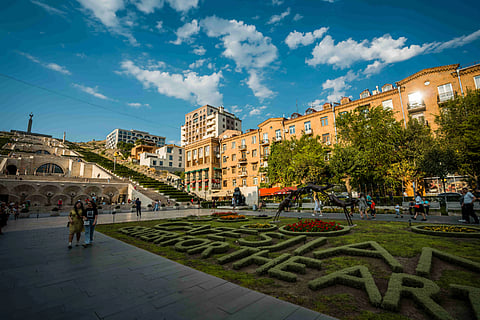How Armenia’s visa-free policy for UAE, GCC residents is fuelling tourism surge
Visa liberalisation, regional peace key to reaching 5 million visitors, says tourism head

Dubai: Armenia is experiencing a significant rise in tourism from the UAE and the rest of the GCC, following a recent government decision to liberalise visa regulations for residents and visa holders from Gulf countries, according to a top Armenia tourism official.
The move, which took effect on July 1, has already yielded impressive results, Lusine Gevorgyan, Head of Armenia’s Tourism Committee, told Gulf News. Lusine said hotels are currently at 95 per cent occupancy, with visitor numbers increasing considerably this summer compared to last year.
She attributed this growth directly to the new policy, which allows GCC residents and those with valid US or Schengen visas to enter Armenia with greater ease.
“The government’s decision was made recently, but we already see a big potential,” Lusine said. “We have a lot of flights from Yerevan to the GCC, and this is important for developing tourism,” she added. The strategy is focused on positioning Armenia as a year-round destination, particularly for GCC travellers seeking diverse experiences, she added.
Regional conflict, long-term goals
While celebrating the tourism boom, Lusine said that regional geopolitical tensions, such as the recent conflict between Israel and Iran, have had a direct and negative impact on the tourism industry. "The Caucasus is a very different region,” she said, confirming that the conflict had caused flight delays and disrupted travel for Armenians and tourists.
To address this, Armenia’s government has launched an initiative called the “Crossroad of Peace.” The programme aims to establish long-term stability by fostering peaceful relations with neighbouring countries, such as Turkey and Azerbaijan, which Lusine believes is essential for both economic and tourism growth.
Armenia’s ‘Crossroads of Peace’ initiative is a project aimed at fostering regional connectivity and economic integration by opening borders and improving transport links with neighbouring countries.
It envisions Armenia as a bridge for trade, transportation, and communication, promoting peaceful relations and economic prosperity in the South Caucasus. The initiative is a comprehensive plan to unblock regional infrastructure and create new transportation routes that would connect the Persian Gulf, the Black Sea, and the Mediterranean Sea, positioning Armenia as a central hub for trade and travel.
“Tourists don’t want to go to places where there is war,” she said. “Our government understands this and has taken on that important role. We are very hopeful that our neighbours will sign this document, and we will have long-term peace in the region.”
Tourism in Armenia
Looking ahead, Armenia has set ambitious goals for its tourism sector. The country aims to reach three million tourists within the next three years and five million within five years. Lusine emphasised that this growth would be guided by a “sustainable tourism” model, not mass tourism.
“We are looking for tourism that respects our culture and our nature,” she said. “We don't expect 8 or 10 million people because our infrastructure and our nature are not suited for mass tourism. We want tourists who are interested in our heritage, our food, and our adventure opportunities, and who will come back again and again.”
Who is travelling to Armenia?
Lusine said that the country is attracting a wide range of travellers, from those seeking luxury experiences in five-star hotels and high-end restaurants to young adventure seekers interested in hiking, biking, and jeeping. Another fast-growing segment is medical tourism, with visitors from GCC countries seeking affordable and high-quality plastic surgery, aesthetic procedures, and dental services, said Lusine.
She concluded by inviting readers to visit and discover the country for themselves, noting that GCC visitors often feel “at home” and return again and again. “People from GCC countries coming to Armenia and feeling that ‘home’ feeling is very important for us,’ she said.
“We are very hospitable, very kind, and we understand their culture.” With its new visa policy, diverse offerings, and strategic focus on peace and sustainable growth, Armenia is ready to welcome more visitors than ever before, she said.
All-year destination
The country’s tourism department has been promoting Armenia as a year-round destination for holidays. Lusine said that from March to May, during Spring, the government is carpeted with lush wildflowers and verdant forests, making it an ideal time for nature walks, photography, and exploring historical sites without the summer crowds.
During summer, from June to August, Armenia comes alive with a packed calendar of cultural events. Lusine highlighted numerous festivals, including several notable ones. During the autumn season, tourists can indulge in a range of gastronomic experiences, from wine-tasting tours to sampling traditional dishes.
Lusine also said the committee is launching a major campaign to attract visitors from the UAE and GCC for the winter season. “Next year, we will promote Armenia as a winter destination,” she explained. “We have beautiful, snowy winters, with a lot of entertainment for people interested in skiing and winter adventures.”
The capital, Yerevan, transforms into a festive wonderland with Christmas markets and a world-renowned Christmas tree. Lusine also said that Armenia is a small, safe, and easily accessible country, making it a significant draw for tourists. “We are one of the safest countries in the world, in the top 10 between Japan and Hong Kong,” she said.
“Everything is very close; it is only 20 minutes to get from the airport to the city centre. Our unique nature is also very close by, which means tourists can experience a diverse range of activities in a single day."
Sign up for the Daily Briefing
Get the latest news and updates straight to your inbox







